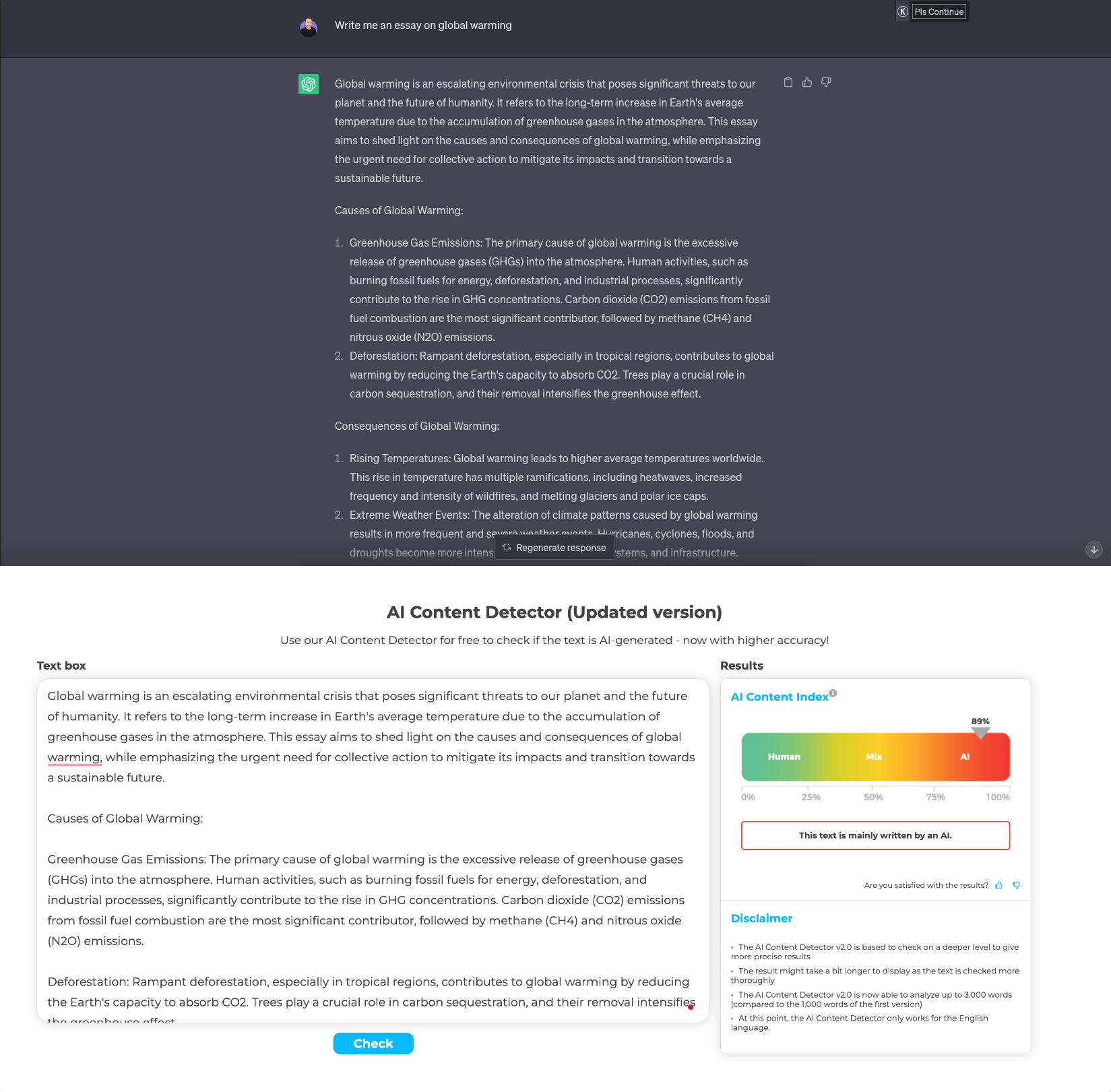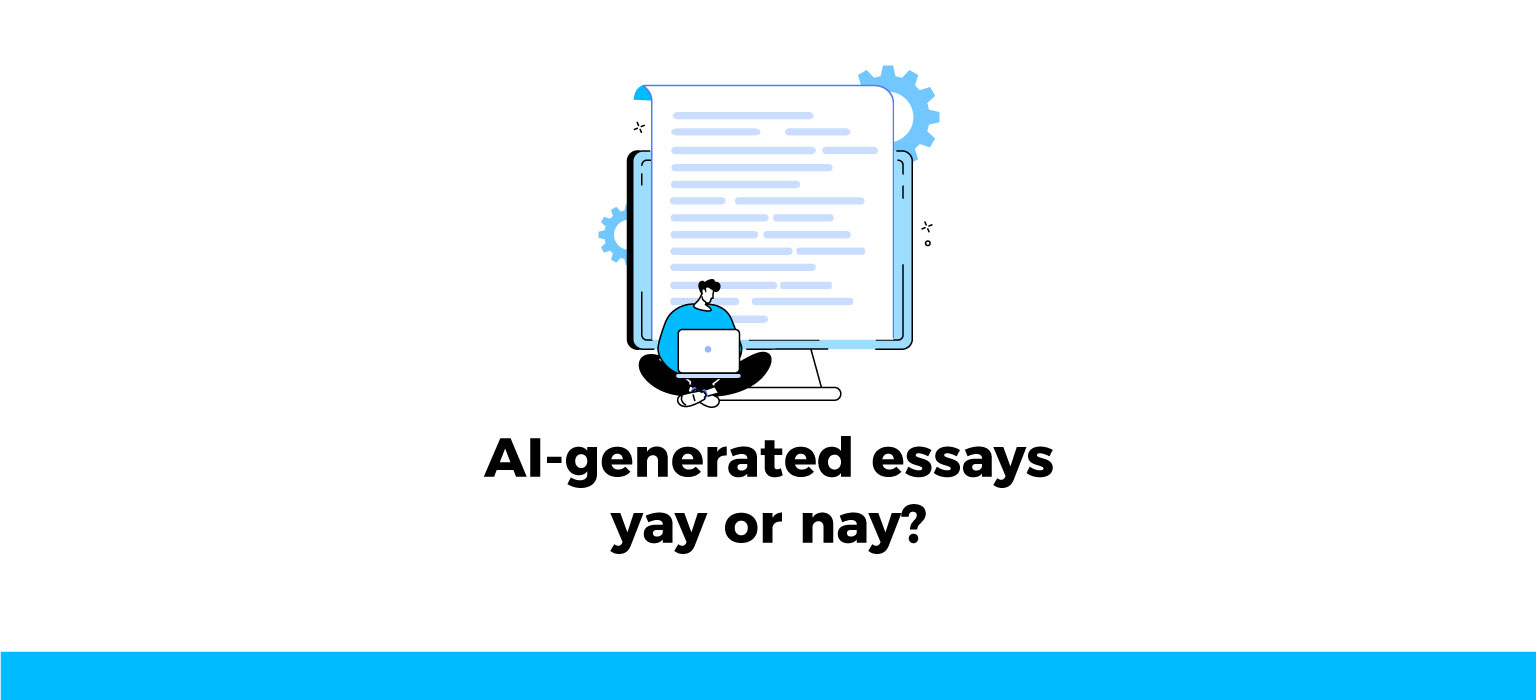Needless to say, AI-generated essays have become more and more prevalent in the academic writing world ever since the introduction of easy-to-reach AI models. ChatGPT has truly made the essay-writing process much simpler, faster, and more efficient. But are there consequences to this? With the gain of popularity, it’s most important to at least understand the implications AI has on the educational world.
The presence of AI-generated essays has risen a lot of concerns when it comes to plagiarism and academic integrity. It has become more crucial than ever to establish ethical boundaries to ensure originality.
But first, let’s specifically understand just what we’re diving into.
What are AI-generated essays?
In essence, AI-generated essays are pieces of content created or generated by an artificial intelligence system such as language models. One of the most famous language models for this has become ChatGPT, especially with the launch of GPT4.
AI models can now cover a wide range of topics that can be tailored down to specific requirements, including essay prompts or word count limits.
One of the key advantages of the popularity of using AI to generate essays is the speed of producing content quickly. Unlike human writing – which requires hours or even days at some point – to complete an essay, AI models can generate a proper essay in a matter of minutes, to be modest. This speed can be very beneficial for tasks that usually require a lot of effort, including academic assignments.
You might also like to read: AI-Generated Content: A Comprehensive Guide
However, like any other thing, there are limitations.
While AI-generated essays are really easy to get, they lack originality and critical thinking. This can be understood from the fact that AI models are trained on already-existing data. The fact that AI models are unable to come up with new things but only rebrand what’s already out there makes the originality decline to a high level.
Additionally, the fact that a whole essay can be generated within minutes absolutely has an impact on critical thinking. One of the main reasons why essays exist in the first place is to make students think on their own and train them in critical thinking part. Also, AI models lack the human expression of emotions that are only available through human writing.
Can AI-generated essays be detected?
The detection of AI-generated essays, as probably understood by now, presents a significant challenge in academic writing communities. As AI models get better and better every day, it has become incredibly hard to distinguish between genuine human content and AI-generated content.
However, the cause is not hopeless at all, and there are different ways how to detect AI-generated essays.
While complex but not impossible, detecting AI-generated content by the naked eye is completely possible. One main ‘issue’ with AI-generated content is that the content itself tends to be repetitive and inconsistent – and also includes unusual patterns as well. More often than not, AI-generated essays tend to stick to a very narrow topic and just repeat the same context with different wording. This is the first sign that the text may be AI-generated.
The next, and probably the best and easiest way is to use an AI detector.
Basically, AI detectors are models that are trained on a vast database of existing data in order to determine whether a piece of text is AI-generated or genuine human-written. They can be very precise and effective when it comes to detecting AI-generated essays. However, as there are two sides of every coin, there is something called false positives. While highly effective and precise, AI detectors can sometimes give out false positives by flagging content that is human-written as AI-generated.
At this point, it’s really a cat-and-mouse game between AI-generated essays and detection methods as AI models continue to evolve. As AI systems become more and more advanced, AI detectors will have to keep pace as well.

Can AI write my paper?
AI has truly made amazing advancements when it comes to natural language processing and generation. This has enabled it to produce written content that amazingly resembles human writing, to a degree. With powerful language models like ChatGPT, there is really a true case where AI can write a paper or essay in a matter of minutes.
According to Futurism, “It looks like algorithms can write academic papers about themselves now. We gotta wonder: how long until human academics are obsolete? ”
However, while it may be able to do so, doesn’t always guarantee good results.
ChatGPT and other language models tend to repeat and lack creativity – which is precisely what is needed from the students when assigned to write an essay. AI can absolutely generate content that is coherent and also grammatically correct, however. But, the point is that it lacks the critical thinking and nuanced understanding that is only available by a human writer at this point.
On the other hand, there are ‘ethical’ use of AI when it comes to writing a paper.
AI can most certainly be useful when it comes to generating ideas and providing research suggestions. ChatGPT is a gem when you’re stuck and need someone to brainstorm with. If you’re good at prompting, ChatGPT can give you different perspectives on various topics that might help you get unstuck. Additionally, AI can also assist you with grammar issues and the overall clarity of the writing.
At the end of the day, the decision of whether to use AI to write a paper for you ultimately depends on the specific context and requirements. The best-case scenario is that AI is used for valuable support on minor fixes while the essential skill and intellectual engagement of the writer remain. With the combination of AI’s help and human creativity, there is absolutely a way to keep things original and to the point.
The key lies in finding the right balance between the two.
Also, back in July 2022, Laura Bacete – a researcher from Sweden – gave GPT-3 a simple directive: “Write an academic thesis in 500 words about GPT-3 and add scientific references and citations inside the text.”
This is an example of what GPT-3 can write about plant cell walls. Maybe not very precise or 100% correct, yet very good. It reminds me of the brief introductions I often write for grant proposals. pic.twitter.com/o4rh5lrirn
— Laura Bacete (@LauraBacete) July 4, 2022
What website detects AI writing?
One of the best websites that detect AI writing is Crossplag.
Especially with the launch of the new AI detector, there have been fewer false positives and more precise results. Additionally, the limit to word checking has been increased from 1,000 to 3,000!
Crossplag’s AI detector is trained to precisely predict the origin of the text by thoroughly analyzing different patterns and anomalies in the provided text. The accuracy will also depend on the quality of the text, the language, and the quantity of the text as well. The more text the user provides, the more accurate the AI detector’s prediction will be.

Korab has dedicated the past decade to the marketing industry, focusing specifically on the intricate field of Search Engine Optimization (SEO). Despite his background in development, Korab’s unwavering passion for marketing drives his commitment to success in the field.
He’s been an Inter fan since he was a kid, which makes him highly patient for results.
Korab does not hike.

